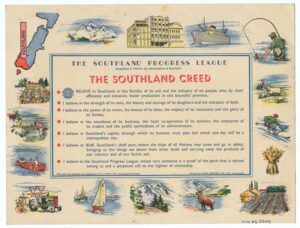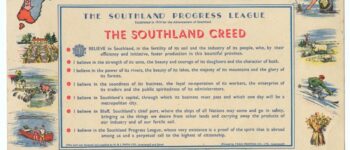1952: The Southland Creed Renewed
April 11, 2023
By AHNZ
 The Southland Progress League came about in 1914, a time of aggressive institutions and parochialism in New Zealand. Or, downright jingoism for that matter. From this came the Southland Creed penned by Southland League member Henry Fowler as published in the Southland Times of 1918.
The Southland Progress League came about in 1914, a time of aggressive institutions and parochialism in New Zealand. Or, downright jingoism for that matter. From this came the Southland Creed penned by Southland League member Henry Fowler as published in the Southland Times of 1918.
Interestingly, this civic energy was still going strong enough in 1952 for the SPL to still exist and to produce and distribute The Southland Creed again as a printed card. The Canterbury Progress League was around in this time period too and able to receive a copy from their Southland peers (Ref. Press Oct 1952.)
It reads…
- I believe in Southland, in the beneficence of its climate, the fertility of its soil and the industry of its people
- I believe in the strength of its sons, the beauty and courage of its daughters, and the character of both.
- I believe in the power of its rivers, the beauty of its lakes, the majesty of its mountains, and the glory of its forests.
- I believe in the soundness of its business, the enterprise-of its traders, and the public spiritedness of its administrators.
- I believe in Invercargill, its capital, through which its business must pass and which- will one day be a city.
- I believe in the Bluff, its chief port, where the ships of all nations may come and go in safety, bringing us the things we desire from other lands and carrying away the products of our industry and of our fertile soil
- I believe in the Southland League whose very existence is a proof of the spirit that is abroad among us and a perpetual call to the highest, citizenship.
The 1950s version was a little modified. For example, Invercargill was next desired to be a metropolitan city. Invercargill achieved the status of city in 1930.
“Henry Fowler not only explored and named many Southland landmarks but took and active interest in the economic development of Southland, particularly in the development of the Kennington, during his period of residence at Ardneil. Ardneil is the grand homestead representing the progress and status of these pioneering Southland leaders.” – Ardneil, Heritage New Zealand
“A High brings renaissance to community life…a desire for investment, growth, and strength…commercial prosperity, institutional solidarity, and political stability. The big public arguments are over means, not ends.” – The First Turning, p101 The Fourth Turning, Strauss and Howe (1997)
“I used to call the old culture the Concrete Playground. Meaning, the pub on one side and the church on the other side and nothing growing in between. A few marching teams and so on. This would be a pioneer Puritan society. It may have had its points 100 years ago but not so much now.” – James K. Baxter, Ref. 1971: New Zealand’s Heritage: The Making of a Nation, AHNZ
It’s a proud bit of localism and territorial identity now long gone. Renewing the Southland Creed was a product of the First Turing/High in our history cycle that came after WW2. The Summer Afternoon High (as AHNZ identifies it) lasted from about 1936 to 1956. For those who lived in it and were served by it this was a great time in New Zealand history but it did not suit the Baby Boomers created by it who turned it on its head.
A New Zealand High will come again. We’ll see statements like the Southland Creed in the 2030s for sure. However, to get to that point we must first experience our next Fourth Turning and that time period isn’t too far off now.
—
Image ref. H & J Smith Ltd., Craig Printing Co. Ltd., Waikawa Museum, nzmuseums.co.nz
Ref. A SOUTHLAND CREED, Southland Times (1918,) Papers Past
 Like Comment Share
Like Comment Share





